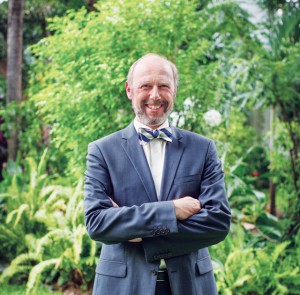Germany’s ambassador to Cambodia, Joachim Baron von Marschall, discusses the challenges the Kingdom faces in catching up with the region’s more
developed nations
What is the biggest challenge Cambodia faces in developing in a sustainable way?
Cambodia needs a solid pool of skilled workers in key manufacturing and service areas if it wants to be really attractive to foreign investors. The argument goes as follows: If Cambodia aims at developing an industry, which produces not only for the relatively small domestic market but for the whole region, it must ensure that its exports are competitive, and competitiveness means quality. And to guarantee product quality and high productivity, you need skilled workers.
How will it get there?
First of all, there needs to be an agreed concept about vocational training in this country. There needs to be well-structured curricula and there should be clarity as to what the goals of the training should be so that the needs of the industry are met. What is needed is a coordinated and systematic approach. There still is another element to take into consideration: From what I hear technical jobs do not enjoy much prestige in this country – many parents feel that their kids should get a ‘white-collar job’, automatically assuming that this is where a lot of money can be made.
Well, if I look at my own country, I have to state that many skilled workers make as much or even more money as people with a university degree do. Often, they even open up their own business later in life, becoming successful entrepreneurs.

What else has to be done?
Apart from generating a skilled workforce, investors often name other key ingredients for a healthy investment policy mix: an affordable and reliable energy supply, good infrastructure to enable smooth logistics and an efficient governance framework which ensures predictability and security with regard to fees and taxes, licencing, fair competition, intellectual property protection and conflict resolution.
There is no doubt a liberal spirit prevailing here when it comes to economic policies – and this is an asset which investors welcome.
However, even a liberal economy needs regulations in order to function properly, and these regulations need to be applied and enforced in an effective and nondiscriminatory way.
Therefore, the rule of law is an important element of a healthy investment climate, ensuring that investors’ interests are well taken care of by professional institutions, be it the executive, or be it the judiciary, such as independent courts which rule in a fair and unbiased manner.
How do you see Cambodia’s economic prospects?
I feel there is considerable economic potential for this country, possibly even as a business hub for the whole region, if we want to talk about a vision for decades to come. The Asean common market will provide interesting opportunities, but it will also create considerable pressure through increased competition. What will ultimately determine Cambodia’s rate of success is the people’s belief in their own capacities and the courage to let go of old patterns.
What must be done to tackle infrastructure shortages?
Indeed, improving infrastructure is one of the key factors in the economic development of the country. Solid roads, railways, ports and airports, communication and electricity lines, and power plants all are needed. Come to think of it, good schools and health services should be included in this package as well. There still is plenty to do, and it needs to be done in a way which reconciles economic with social and ecological interests.
Where do capital and expertise come from?
At the moment, the answer is predominantly from donors, and only to a comparatively small degree from the Cambodian government and the private sector. The present scheme probably will not suffice for the huge tasks still ahead. For this to change, it needs a plausible marketing concept for the whole country. Building trust and confidence among international market players must be the top priority, if the quantum leap into the future is to become a reality.

